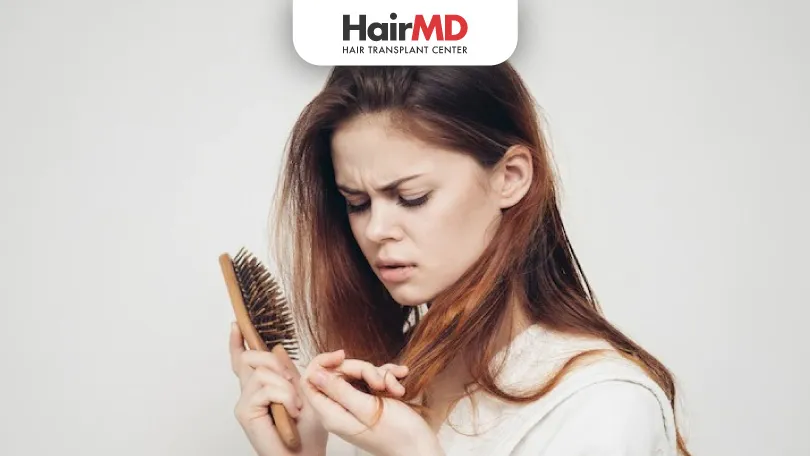Hormones are very much necessary for the normal functioning of our body. No wonder, they are called the elixirs of the human body. Without these hormones, our organs won’t get any direction or order to function and we will collapse. It is also sometimes seen that these hormones are secreted in lesser or in larger amounts than necessary due to various reasons and may cause hazardous health effects.

Table Of Content
- Hormones and hair loss
- Conclusion
Hormones and hair loss
Hormones cause hair loss, among various other symptoms. Here’s a list of hormones that may lead to hair fall.
- DHT Hormone:
Women have DHT (dihydrotestosterone) in trace amounts. It causes DHT hair loss like it contributes to male pattern baldness. Let’s check how DHT hormone is responsible for hair loss in females:
- Testosterone converts to DHT with the enzyme 5 – alpha reductase.
- The level of DHT binding to receptors in scalp follicles is mainly in the crown area.
- DHT shrinks hair follicles, making it difficult for healthy hair to survive.
- The hormonal process of testosterone converting to DHT, which harms hair follicles, happens in both men and women.
- Under normal conditions, women have a minute fraction of the level of testosterone than men, but even level can cause DHT. This triggers hair loss in women.
- Thyroid Hormone:
Hair loss in females can also be caused by an imbalance of thyroid hormones. Hormonal hair loss or fall is also one of the main symptoms of hypothyroidism. Thyroid hormones affect every part of the body, including the cells of the hair follicle. Thyroid hormone prolongs the growth phase of the hair cycle and inhibits spontaneous rest phase of the hair growth cycle. So, low levels or very high levels of thyroid hormone cause the sudden onset of the rest phase, leading to hair loss.
- Estrogen:
Women’s hormone levels decline as menopause approaches and drop sharply during and after menopause. As the ovaries become nonfunctional, the secretion of estrogen hormone reduces in the body. Hence, hair loss occurs. Normally, estrogen prolongs the anagen or growing phase of hair and also delays its progression to shedding phase.
After pregnancy, the estrogen level in the body of the mother reduces. As a result, hairs go in the resting phase, which makes them come out of the scalp. It will happen generally after the 12 weeks of delivery only.
- Prolactin:
Prolactin is produced by pituitary glands, which are located at the base of the brain. So, during pregnancy and breastfeeding, it is normal for prolactin levels to rise high. Hyperprolactinemia is responsible for hair loss in females.
- Cortisol:
High stress levels contribute to hair loss. Hair follicles respond to stress by turning off hair growth. Hyaluronan and proteoglycans are important to skin elements that are responsible for hair growth. High cortisol levels reduce synthesis and also accelerates the degradation of these two skin elements almost by 45%. This leads to the shortened growth cycle of hair, consequently leading to hair loss.
- Insulin:
There is a correlation between hair loss and insulin resistance. Insulin resistance is a condition in which the body’s cell becomes resistant to insulin due to multiple factors such as poor lifestyle choices. With insulin resistance, the pancreas produces more insulin, because of which blood sugar level rises. Elevated blood sugar levels lead to higher cortisol levels and free radicals. High cortisol level is associated with hair loss, as we have discussed earlier.
You can also watch this video to learn more about how DHT causes hair loss:
Conclusion
Popular Q&As
Discover affordable hair transplant solutions in India, including factors affecting pricing and available treatments. Losing too much hair can be concerning. find out about the common causes of hair loss and learn how to prevent further thinning at HairMD Pune The most effective shampoo for men’s hair loss, formulated to strengthen hair and minimise thinning.
What is the cost for hair transplant in India?
Why Is My Hair Falling Out So Much?
Best Hair Loss Shampoo for Men: Expert Tips | HairMD
We Got Your Back! Ask Us Anything On Your Mind!
Reach out to us on


